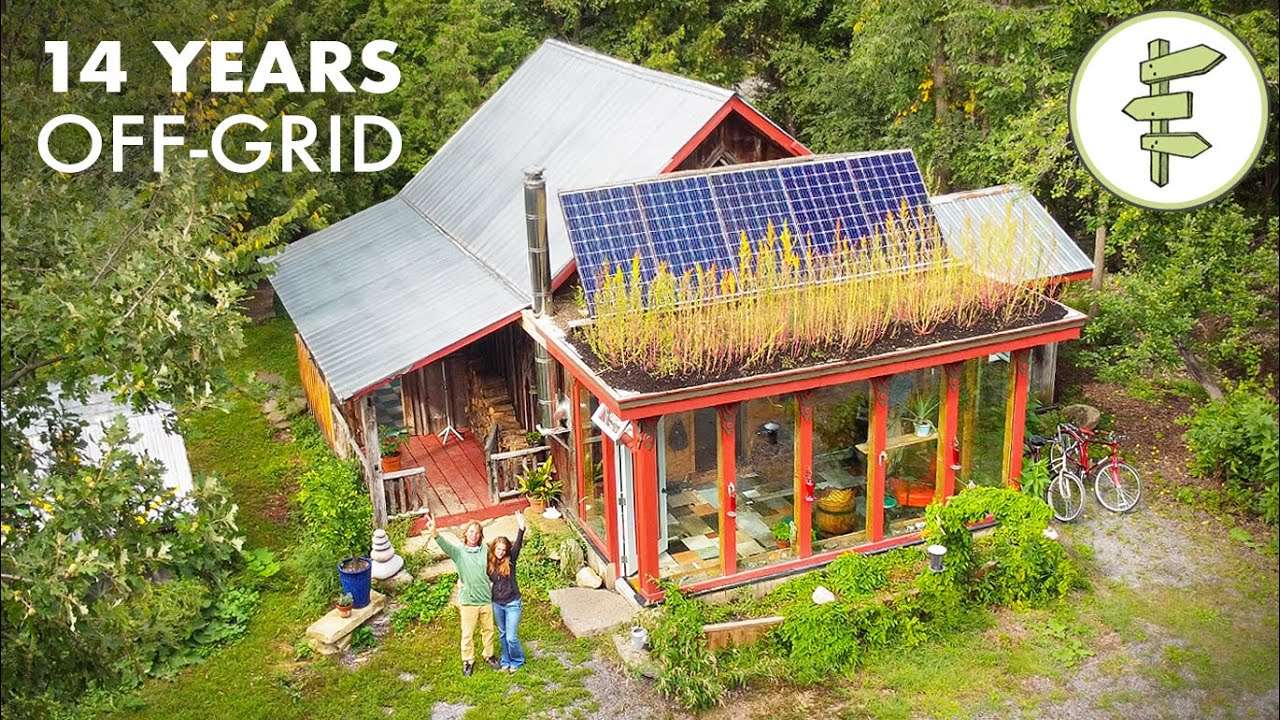Living off the grid doesn’t mean you have to forgo making money. In fact, many off-gridders have found creative ways to generate income while maintaining their self-sufficient lifestyle. Whether it’s selling products online, teaching survival skills, or operating an off-grid restaurant, off-gridders have discovered a multitude of opportunities for financial sustainability. From offering handyman services to hosting educational workshops, these inventive individuals combine ingenuity and resourcefulness to support themselves while living off the grid. In this article, we explore the various ways in which off-gridders can make money and highlight the key aspects of their unique way of life.
Making Money off the Grid: Exploring Profitable Ventures
Living off the grid doesn’t necessarily mean living without income. In fact, many off-gridders have found innovative ways to generate money while maintaining their self-sufficient lifestyle. Whether it’s through selling products online, teaching valuable skills, or tapping into the growing demand for sustainable goods and services, there are numerous opportunities to forge a successful off-grid business. This article will delve into ten distinct ventures that can be pursued off the grid, providing guidance on how to get started and thrive in each field.

Selling Products Online
Various platforms for online selling
With the rise of e-commerce, selling products online has become an increasingly popular and profitable venture for off-gridders. The digital marketplace offers various platforms where you can showcase and sell your products. Websites like Etsy, eBay, and Amazon Handmade cater specifically to artisans and small businesses, allowing you to reach a wide customer base. Additionally, setting up your own website or utilizing social media platforms to promote and sell your products can provide even greater control and flexibility over your business.
Types of products to sell
When it comes to choosing what to sell online, the possibilities are virtually endless. From handmade crafts and jewelry to vintage items or even homemade food products, you can leverage your skills and passions to create unique products that resonate with your target market. Consider your expertise, interests, and available resources to determine which products are the best fit for your online business.
Marketing strategies for online selling
To succeed in the competitive online marketplace, it’s crucial to develop effective marketing strategies. Utilize social media platforms to engage with potential customers, share captivating content, and build a loyal following. Additionally, optimizing your product listings with high-quality photos, descriptive titles, and engaging product descriptions can significantly enhance your visibility and increase sales. Don’t underestimate the power of word-of-mouth advertising – encourage satisfied customers to leave reviews and recommend your products to others.
Teaching Survival or DIY Skills
Identification of marketable survival or DIY skills
In today’s uncertain times, there is a growing interest in acquiring survival skills and the ability to be self-reliant. As an off-gridder with first-hand experience, you have valuable knowledge to share. Identify the survival or DIY skills that you excel in and have a marketable appeal. This could range from wilderness survival techniques and primitive cooking to off-grid construction and renewable energy solutions. Look for gaps in the market and tailor your teaching offerings accordingly.
Creating and promoting online courses
Online learning has gained tremendous popularity, making it an ideal platform for teaching survival or DIY skills. Create comprehensive online courses that offer step-by-step instructions, practical demonstrations, and supplementary resources. Platforms like Udemy, Coursera, or Teachable allow you to host and promote your courses to a global audience. Leverage the power of social media, email marketing, and content creation to attract students and establish yourself as an authority in your field.
Organizing in-person workshops and classes
While online courses provide a convenient option, there is still a demand for in-person workshops and classes, particularly among individuals who prefer hands-on learning experiences. Advertise your workshops locally or within your off-grid community, targeting individuals who share an interest in self-sufficiency and survival skills. Collaborate with local community centers, schools, or outdoor organizations to maximize your reach. Provide a memorable and engaging experience to leave participants with practical skills and a desire for further learning.
Growing Mushrooms
Choosing the right type of mushrooms to grow
Mushroom cultivation can be a lucrative venture for off-gridders due to its relatively low startup costs and high-profit margins. However, it’s essential to select the right type of mushrooms to grow based on your climate, available space, and market demand. Popular options include oyster mushrooms, shiitake mushrooms, and medicinal mushrooms like lion’s mane or reishi. Research the cultivation requirements of each mushroom variety to ensure optimal growth and yield.
Setting up a mushroom growing operation
Setting up a mushroom growing operation requires careful planning and attention to detail. Create a suitable growing environment by constructing a climate-controlled space or repurposing existing structures like basements, sheds, or shipping containers. Invest in quality substrate materials, such as straw, sawdust, or wood chips, and follow proper sterilization techniques to prevent contamination.
Once you have established your growing setup, source high-quality mushroom spawn from reputable suppliers. Introduce the spawn to the substrate and maintain optimal temperature, humidity, and ventilation conditions to encourage healthy mycelium colonization and fruiting. Regularly monitor and manage pests and diseases to ensure a successful harvest.
Marketing and selling mushrooms
To successfully sell your mushrooms, it’s important to identify potential customers and create effective marketing strategies. Reach out to local restaurants, gourmet food stores, and farmers’ markets to establish partnerships and secure regular buyers. Consider packaging your mushrooms attractively, using eco-friendly materials whenever possible. Leverage the power of social media platforms and online marketplaces to broaden your customer base and generate online sales. Participating in local food festivals and events can also provide valuable exposure and networking opportunities.
Selling Crops at Farmer’s Markets
Identifying popular crops for market sale
Farmer’s markets provide an excellent platform for off-gridders to showcase and sell their homegrown produce. Identifying popular crops that have high demand at these markets is crucial for a profitable venture. Consider growing staple vegetables like tomatoes, peppers, leafy greens, onions, and root crops. Additionally, explore unique or heirloom varieties that can set you apart from other vendors and attract niche customers.
Growing crops organically
With the increasing demand for organic produce, adopting organic growing practices can be a differentiating factor for marketability and profitability. Ensure that you adhere to organic farming principles by avoiding synthetic pesticides, herbicides, and genetically modified seeds. Implement sustainable irrigation methods, practice crop rotation, and focus on improving soil health through composting and natural fertilizers.
Tips for successful farmer’s market selling
Succeeding at farmer’s market selling requires more than just quality produce. Engaging with customers, creating an attractive display, and building relationships are essential elements. Offer samples of your produce to let customers taste the freshness and quality of your crops. Clearly label your products, including any unique features like organic certification or heirloom varieties. Regularly update and diversify your offerings to keep customers coming back week after week. Don’t underestimate the power of excellent customer service – be friendly, knowledgeable, and ready to answer any questions customers may have.

Renting Off-Grid Properties
Preparing off-grid properties for rental
As an off-gridder, your remote property can be an attractive destination for individuals seeking a unique vacation or retreat experience. Before renting out your off-grid property, ensure it is prepared to meet the needs of guests. Install necessary amenities such as solar panels, water filtration systems, and composting toilets to ensure a comfortable stay. Implement safety measures and provide clear instructions on operating off-grid systems. Regularly maintain and update your property to meet the expectations of guests.
Advertising and managing off-grid property rentals
Effectively advertising your off-grid property rental can help attract potential guests and maximize occupancy rates. Create captivating listings on vacation rental platforms like Airbnb, VRBO, or Glamping Hub, highlighting the unique features of your off-grid property and the surrounding natural beauty. Utilize professional photography to showcase the property and create an enticing online presence. Provide comprehensive and accurate information about the off-grid experience, including any limitations or specific requirements.
Managing off-grid property rentals necessitates excellent communication, organization, and responsiveness. Clearly communicate your expectations and house rules to guests, and be readily available to address any issues that may arise during their stay. Automate booking processes and maintenance tasks to streamline operations and ensure a smooth guest experience. Consider partnering with local service providers or hiring a property management company if you require assistance managing your rental business.
Legal considerations for off-grid property rentals
Before embarking on an off-grid property rental business, familiarize yourself with the legal considerations involved. Research zoning and land use regulations specific to your area to ensure compliance with local laws. Understand the implications of liability insurance, permits, licenses, and tax obligations associated with running a rental property. Consulting with a lawyer or seeking advice from local authorities can provide valuable insights and guidance to navigate these legal considerations.
Guiding Hikers and Hunters
Obtaining necessary licenses and permits
Guiding hikers and hunters can be a fulfilling profession for off-gridders who have a deep knowledge of local trails and hunting grounds. However, it’s important to ensure that you have the necessary licenses and permits to operate legally. Research the requirements set by local authorities or outdoor governing bodies and obtain the appropriate certifications. Stay updated on any changes to regulations to avoid any legal issues.
Creating guided tours and experiences
To create unique and memorable guided tours and experiences, utilize your intimate knowledge of the local terrain, flora, and fauna. Craft engaging itineraries that cater to different skill levels and interests. Offer guided hikes, wildlife spotting expeditions, or hunting trips tailored to the preferences of your clients. Incorporate educational elements, sharing knowledge about the ecosystem, history, or cultural significance of the area. Go above and beyond to ensure the safety and satisfaction of your guests.
Promoting and marketing services to hikers and hunters
Successful marketing is essential to attract hikers and hunters to your guiding services. Create a professional website that showcases your expertise, certifications, and testimonials from satisfied clients. Leverage social media platforms to share captivating visuals of your guided tours and interact with potential clients. Collaborate with local outdoor stores, hotels, and tourism boards to showcase your services and reach a wider audience. Offer referral incentives to satisfied clients who recommend your services to others, and consider partnering with other local outdoor guides to cross-promote your offerings.

Writing Books about Off-Grid Living
Selecting a niche within the off-grid living genre
Writing a book about off-grid living allows you to share your experiences, knowledge, and insights with a broader audience. However, it’s important to select a niche within the off-grid living genre to stand out from the competition and cater to a specific readership. This could be a focus on sustainable energy solutions, off-grid gardening, or practical tips for living off the land. Determine your unique selling point and target audience to refine your book’s content and angle.
Researching and writing a compelling book
Thorough research is essential when writing a book about off-grid living. Before sitting down to write, delve into existing literature, scientific studies, and personal anecdotes to gather relevant information and inspiration. Organize your findings, outline your chapters, and ensure a logical flow of content. Write in a compelling and relatable manner, blending personal experiences with factual insights. Consider seeking input from trusted beta readers or experts in the field to enhance the quality of your book.
Publishing and marketing the book
Once you have completed your manuscript, it’s time to publish and market your book. Research different publishing options such as traditional publishing, self-publishing, or hybrid publishing, considering the benefits and drawbacks of each. If self-publishing, invest in professional editing, design, and formatting services to ensure a polished final product. Create an author website and social media presence to build a platform and engage with potential readers. Develop a strategic marketing plan, including book signings, guest blogging, podcast appearances, and solicit reviews from influencers to generate buzz and increase sales.
Selling Eggs
Raising chickens for egg production
Egg production can provide a steady source of income for off-gridders while requiring minimal space and resources. Start by raising a flock of chickens suitable for egg production. Select breeds known for their high egg production rates and adaptability to your local climate. Provide a comfortable and secure coop, ensuring adequate space and proper ventilation for your chickens. Implement organic or natural feeding practices to produce high-quality, nutritious eggs.
Packaging and marketing eggs
Proper packaging and marketing are crucial when selling eggs. Invest in egg cartons or containers that protect and preserve the freshness of your eggs. Consider branding your packaging with your farm logo or a personalized label to create a professional and distinctive image. Maintain proper storage and handling practices to ensure the longevity and safety of your products. Market your eggs through local farmers’ markets, online platforms, or by establishing partnerships with local grocery stores, restaurants, and bakeries. Emphasize the quality, freshness, and ethical practices associated with your eggs to attract health-conscious and environmentally-conscious consumers.
Finding potential customers
Identifying potential customers is key to a successful egg-selling venture. Consider conducting market research to understand the demand for locally-sourced, organic, or pasture-raised eggs in your area. Engage with your community by attending farmers’ markets, joining local food co-ops, or participating in agricultural events to connect with potential customers directly. Utilize social media platforms to showcase your farming practices, answer inquiries, and attract customers. Foster relationships with local businesses, such as restaurants or caterers, who may value the quality and sustainability of your eggs.

Operating an Off-Grid Restaurant
Designing and building an off-grid restaurant
Operating an off-grid restaurant allows you to combine your passion for food with your self-sufficient lifestyle. Begin by designing and building a sustainable and energy-efficient restaurant space. Incorporate renewable energy sources like solar panels or wind turbines to power your operations. Implement water conservation measures, such as rainwater harvesting or greywater recycling, to reduce your environmental impact. Choose energy-efficient appliances and utilize efficient waste management practices to minimize the resource footprint of your restaurant.
Creating a unique menu
Crafting a unique menu is essential in attracting customers to your off-grid restaurant. Utilize locally-sourced, seasonal ingredients to emphasize the freshness and sustainability of your offerings. Consider growing your own produce or forging partnerships with local farmers to ensure a constant supply of high-quality ingredients. Create diverse and inventive dishes that cater to different dietary preferences, including vegan, vegetarian, and gluten-free options. Showcase the flavors and techniques of your region while incorporating your personal off-grid expertise into the menu.
Attracting customers and managing operations
Effectively attracting customers and managing the operations of your off-grid restaurant are crucial for long-term success. Leverage social media and online platforms to promote your restaurant and engage with potential customers. Develop a captivating website that showcases your unique offerings, sustainable practices, and off-grid lifestyle. Offer special events like themed dinners, cooking classes, or farm-to-table experiences to create a memorable dining experience. Focus on exceptional customer service, fostering a warm and welcoming environment that keeps guests coming back. Implement efficient reservation systems and optimize the flow of operations to ensure a seamless experience for both staff and patrons.
Creating a YouTube Channel about Living Off the Grid
Identifying an engaging off-grid living content theme
Creating a YouTube channel allows you to share your off-grid lifestyle, experiences, and knowledge with a global audience. To attract viewers and gain subscribers, it’s important to identify an engaging content theme for your channel. This could be documenting your everyday off-grid life, showcasing DIY projects and self-sufficiency hacks, or providing tutorials on sustainable living practices. Find a unique angle or storytelling approach that sets your channel apart from the numerous off-grid content creators already on YouTube.
Producing high-quality videos
High-quality video production is essential in capturing and retaining viewers’ attention. Invest in a good camera, microphone, and lighting equipment to ensure professional-looking videos. Consider the composition, framing, and audio clarity in each shot. Plan your content in advance and script or outline your videos to ensure a coherent and engaging narrative. Edit your videos meticulously to create a polished final product. Utilize editing software to enhance visual and audio aspects, add captions or graphics, and create a consistent branding aesthetic.
Gaining subscribers and monetizing the channel
Gaining subscribers and monetizing your YouTube channel requires consistent effort and strategic planning. Regularly upload content that aligns with your chosen theme and appeals to your target audience. Utilize SEO techniques by optimizing titles, descriptions, and tags to improve discoverability. Engage with your viewers through comments, live streams, or social media interactions to foster a sense of community. Once your channel meets eligibility requirements, consider joining the YouTube Partner Program to monetize your videos through ad revenue. Additionally, explore other revenue streams such as brand sponsorships, merchandise sales, or crowdfunding platforms like Patreon to further support your off-grid lifestyle.
Living off the grid doesn’t mean forgoing financial stability. By harnessing your skills, knowledge, and resourcefulness, you can tap into various profitable ventures while enjoying the freedom and self-sufficiency off-grid living offers. Whether it’s selling products online, sharing your expertise through teaching or guiding, or pursuing sustainable agriculture, the opportunities are abundant. Embrace your entrepreneurial spirit, hone your chosen craft, and pave the way for financial success while embracing off-grid living.




